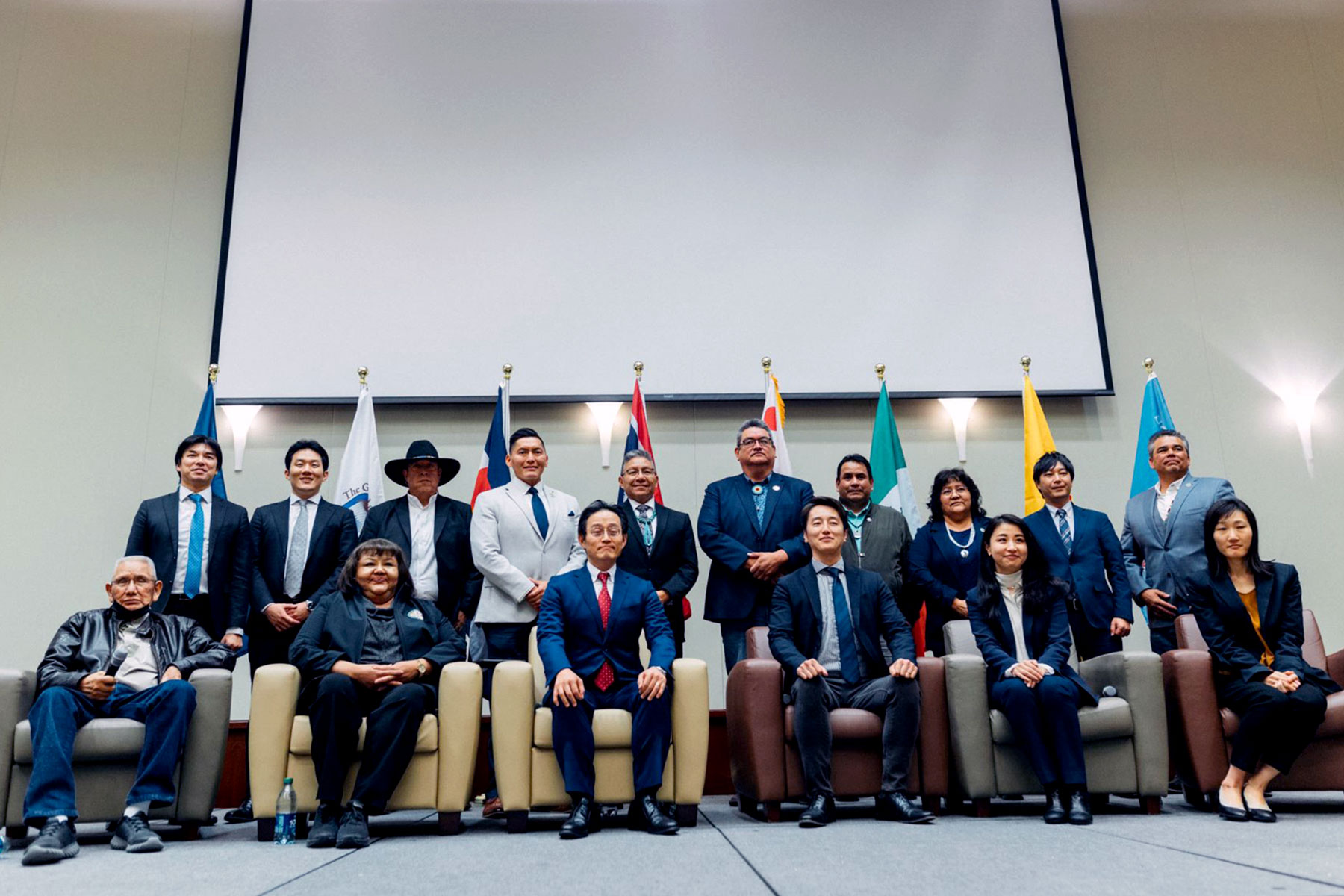Joining WSTN alongside Navajo Nation, Crow and Ute Tribes
As we wrap up an eventful, unprecedented year in the energy world, we wanted to share the important takeaways and the future paths we learned from the successful Western States and Tribal Nations (WSTN) West Coast LNG Export Forum held at Colorado Mesa University on Dec. 12-13 in Grand Junction, Colo. The university is a fitting venue because it is there that the seed which led to WSTN’s formation was first planted.
Fast forward three years: WSTN welcomed its eighth government member, the Jicarilla Apache Nation, when President Edward Velarde signed WSTN’s governing Memorandum of Understanding and made his nation our third sovereign tribal nation signatory – a highlight of our forum.
A delegation from Japan’s Ministry of Economy, Trade and Industry led by Oil & Gas Division Director Takeshi Soda (front, third from left) joins senior leaders from the Navajo Nation, the Crow Tribe of Indians and WSTN members the Ute Indian Tribe, the Southern Ute Indian Tribe and our newest member, the Jicarilla Apache Nation, represented by President Edward Velarde (front, first from left).
The event brought together many of the finest minds in Rockies natural gas, global LNG infrastructure and Tribal Nation energy development. In keeping with our pedigree as a government-led organization with members from multiple nations, tribal nations and states, WSTN hosted a high-level delegation from Japan’s Ministry of Economy, Trade and Industry’s (METI) Oil & Gas Division – LNG thought leaders and architects of Asia’s lower-carbon future — as Japan prepares to take the presidency of the Group of Seven (G7) industrialized nations. U.S. Ambassador to Japan Rahm Emanuel sent a video keynote address that captured the current urgent global need for American LNG as a road to allied energy security, fast on the heels of the start of the U.S.-Japan Energy Security Dialogue.
As for our takeaways from the forum, here are five that will shape our activities in 2023 and beyond:
Rockies producers lead the way on decarbonizing gas
The Rockies states of New Mexico, Colorado and Wyoming are, as a region, leading the way in decarbonizing natural gas production. Claims over whose molecule is the cleanest turned into a friendly verbal rivalry among state delegates to the forum, but the importance of this growing recognition by the industry cannot be overstated, a fact a supportive editorial by The Grand Junction Daily Sentinel noted in response to the forum. Part of WSTN’s mission is helping our allies in Asia lower their carbon footprint by replacing dirtier power generation fuels. Cleaner production here lowers overall emissions further and makes our LNG more attractive to commercial partners and the governments that regulate them.
Asia’s need for American LNG is an emergency for many nations
Asia’s need for U.S. LNG from the West Coast has only become more urgent since Russia’s invasion of Ukraine, a fact METI Oil and Gas Division Director Takeshi Soda shared in a deeply informative presentation that laid bare the emergency-level LNG shortages in Asia that Europe’s war-increased demand has caused. High current prices are the predictable result, but long-term contracts that can start supplying at stable prices are all but sold out until 2026 and LNG procurement is in a “state of war,” Soda told the audience. Japan’s government is facilitating investments to ensure its own energy security, including through direct investment in upstream and midstream assets. This presents a major opportunity for West Coast LNG exports and Rockies natural gas.
American LNG exports are now a formal U.S. policy and diplomatic tool
The Biden Administration in both Japan and the U.K. has formally made LNG exports part of its short- to medium-term policy for solving energy shortages. Ambassador Emanuel gave the reason succinctly in his keynote address: “President Putin’s invasion of Ukraine and weaponization of energy demonstrate clearly the danger of depending on despots for your energy security and needs. Industrialized economies cannot be that vulnerable in the future. A clear lesson is to import LNG from your friends.”
Tribal nations face duel layers of federal bureaucracy and need urgent permitting reform
Our panel on tribal perspectives on energy production brought together top leaders from the Navajo Nation, the Crow Tribe of Indians and our member nations the Ute Indian Tribe, the Southern Ute Indian Tribe and the Jicarilla Apache Nation. All five tribes have energy development interests and shared their concern that the use of their sovereign land is hampered by the “paternal approach,” as one panelist put it, taken by the federal government bureaucracy. Panelists questioned the commitment to genuine tribal consultation and urged immediate reform to layers of red tape that means tribes must follow Bureau of Indian Affairs and Environmental Protection Agency rules even to build roads on their reservation, let alone develop energy resources. The lively, frank discussion capped our first day’s packed agenda.
Solutions for the infrastructure and financing challenges of exporting Rockies gas
The second day’s invitation-only session focused on Rockies resources and the potential for WSTN’s governments to create concrete and creative solutions to solve the infrastructure and financing challenges in getting Rockies gas to market. This dialogue produced several action items and strategies that we’ll share in the coming weeks and months.
Special thanks for the forum’s success are owed to the state and tribal governments which lead us, their Board representatives, and our supporters from across the LNG industry whose expertise is invaluable.
As we enter our fourth year and third as a formally incorporated organization, WSTN’s founding vision is beginning to take concrete steps toward becoming a reality and we will work throughout 2023 and beyond to build on our progress. We’ll have more to share about our plans in the New Year.
On behalf of WSTN, wishing you all happy holidays and a Happy New Year.

